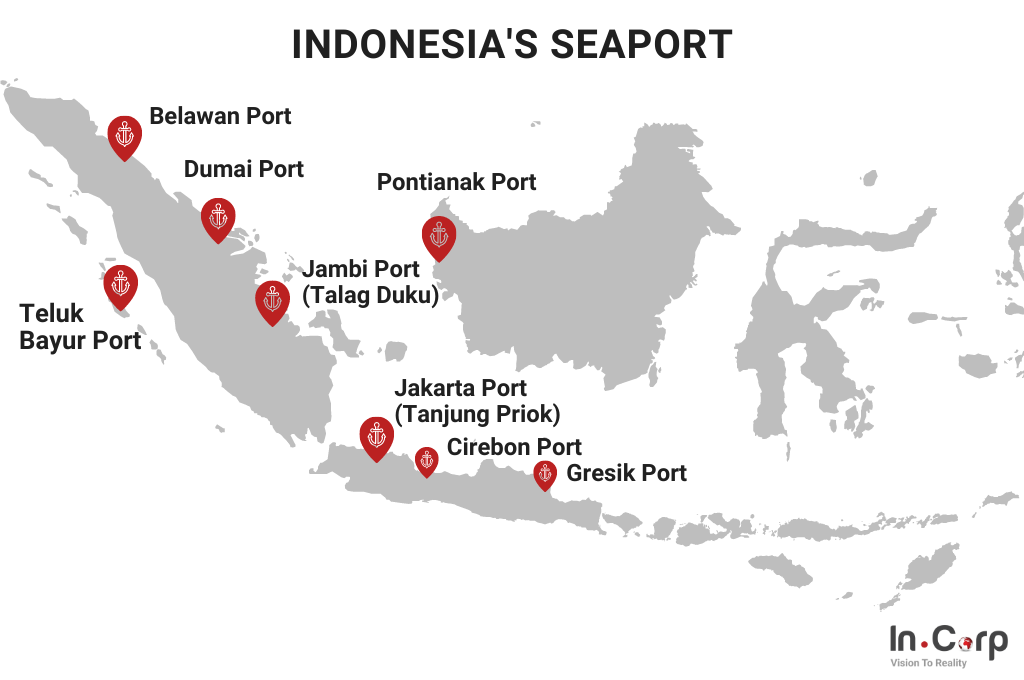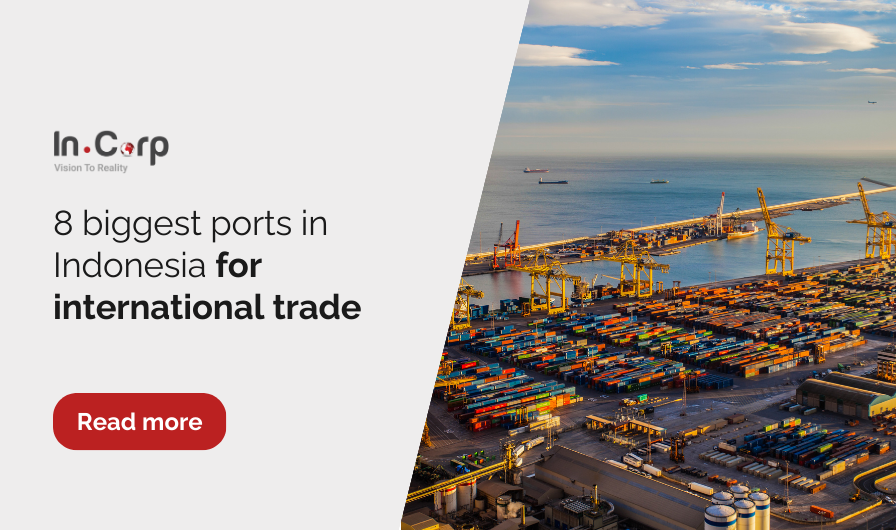Ports in Indonesia serve as the lifeblood of the nation’s economy. Every port is strategically positioned to capitalize on its island geography and global trade routes. Indonesia has an extensive network of ports spread across its 17,500 islands, which serve specific cargo types and play a vital role in international trade.
The benefits of ports in Indonesia for international trade
Ports in Indonesia play a crucial role in trade and logistics by connecting islands and other countries. Here’s why they’re vital:
Access to international trade
Indonesia’s ports are gateways to international trade, linking land and sea transportation networks. They handle various types of cargo, enabling exports, imports, and transit shipments. Ports facilitate seamless transshipment between different modes of transportation.
Efficient cargo handling
Ports have specialized facilities that efficiently handle cargo and offer storage and warehousing services. Container terminals within ports manage global containerized trade, ensuring smooth cargo flow and reducing transit times.
Logistical hubs
Ports act as logistical hubs, providing value-added services like customs clearance and documentation. Many ports have free trade or special economic zones, offering incentives to attract international businesses.
Infrastructure and connectivity
Ports require extensive infrastructure, including deep-water berths and well-connected road and rail networks. They invest in advanced technologies to enhance operational efficiency and optimize cargo handling.
Employment generation
Ports create direct employment for dockworkers and logistics professionals, with a multiplier effect on the economy. They stimulate economic growth by attracting businesses and investment to surrounding areas.
Read more: Navigating the landscape of Indonesian imports
How can ports boost Indonesia’s economic growth?
Indonesia, strategically located in Southeast Asia, is a pivotal maritime hub. Its extensive coastline, bordered by the Indian and Pacific Oceans, attracts foreign investors.
As the world’s largest archipelago, comprising over 17,000 islands stretching across 5,000 kilometers, Indonesia relies heavily on its maritime sector to facilitate the movement of goods and people across its vast territory.
These geographical advantages present Indonesia with significant maritime economic potential, evidenced by its international maritime cargo traffic surpassing 506 million metric tons in 2022, placing it among the leading Southeast Asian countries in cargo throughput.
However, despite this robust flow, Indonesia faces connectivity and trade cost challenges, as indicated by its liner shipping connectivity index, which remained below 38.26 as of the fourth quarter of 2023.
Indonesia’s maritime landscape includes key port cities such as Jakarta in the west, home to Tanjung Priok, the nation’s largest container port, and Surabaya in the east, a vital player in international trade with the port of Tanjung Perak.
Furthermore, Medan in the north, with the Sumatran port of Belawan, is a crucial hub for goods handling in the northern region.
8 major ports in Indonesia for international trade

Indonesia has at least eight of its biggest ports, serving as national and global trade gateways. Those are:
Jakarta Port (Tanjung Priok)
It serves as Indonesia’s primary port. Strategically located on Java Island’s northern coast at the mouth of the Ciliwung River, it is approximately 116 nautical miles east-southeast of Panjang Port on Sumatra Island.
The port handles 45 million tonnes of cargo, around 8 million TEUs annually, and employs over 20,000 workers.
Belawan Port
It is located on Sumatra’s northeast coast, facing the Strait of Malacca, and serves Medan, North Sumatra’s largest city.
It’s Indonesia’s busiest port outside Java, handling a diverse range of cargo, including palm oil, rubber, tea, and tobacco. Approximately 2000 vessels and 12 million tonnes of cargo pass through annually.
Dumai Port
It is located on Sumatra’s southern side along the Rupat Strait and primarily serves as a crude oil shipment port managed by PT Caltex Pacific Indonesia.
With an adjacent oil refinery operated by Pertamina, the port handles general cargo, fertilizers, rice, and log exports, welcoming over 6000 ships annually.
Cirebon Port
Situated on Java’s northern shores facing the Java Sea, it supports inter-island trade, exporting sugar, rice, and various commodities while handling tobacco, cement, and machinery imports.
Gresik Port
Located on Java’s western end near Surabaya, it was a crucial port in the past, serving as a key port of Selat Surabaya before Tanjung Perak port’s establishment.
Managed by the Public Port Corporation, Gresik Port accommodates cargo ships, small crafts, and ferries, with facilities for anchorage timber-carrying boats from Papua, Kalimantan, and Celebes.
Jambi Port (Talag Duku)
Also known as Talag Duku, it serves as the shipping and trading hub of Jambi province on Sumatra’s east coast, managed by Indonesia Port Corporation II.
The port facilitates the trade of commodities like oil, rubber, rice, and timber, with approximately 5000 vessels and 480,545 tonnes of cargo handled annually.
Teluk Bayur Port
Situated on Bayur Bay in Padang, West Sumatra is the largest and busiest port on the island’s western coast. It handles around 3000 vessels and 7,200,000 tonnes of cargo annually.
Pontianak Port
Located on the banks of a river in western Borneo, it serves as a vital trading post, attracting domestic and international ships, handling approximately 7,000 vessels, 143,500 TEU, and 3,475,700 tonnes of cargo annually.
Start leveraging international trade with InCorp
With its strategic location and well-established port infrastructure, Indonesia offers vast opportunities for businesses involved in import and export.
InCorp Indonesia can help you navigate the import and export landscape in Indonesia. Our team of experts ensures seamless regulatory compliance by handling your import licenses and export services.
Let us help you unlock the full potential of Indonesia’s import-export market by clicking the button below.
Get in touch with us.
What you'll get
A prompt response to your inquiry
Knowledge for doing business from local experts
Ongoing support for your business
Disclaimer
The information is provided by PT. Cekindo Business International (“InCorp Indonesia/ we”) for general purpose only and we make no representations or warranties of any kind.
We do not act as an authorized government or non-government provider for official documents and services, which is issued by the Government of the Republic of Indonesia or its appointed officials. We do not promote any official government document or services of the Government of the Republic of Indonesia, including but not limited to, business identifiers, health and welfare assistance programs and benefits, unclaimed tax rebate, electronic travel visa and authorization, passports in this website.



